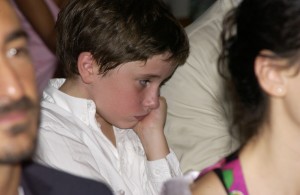 The majority of small children are naturally inclined to seek comfort from a parent or caregiver. It makes sense that they feel upset when forced to be away from the one they perceive to be their main source of safety.
The majority of small children are naturally inclined to seek comfort from a parent or caregiver. It makes sense that they feel upset when forced to be away from the one they perceive to be their main source of safety.
Parents can hear mixed information about the best way to deal with separation anxiety. Should they ignore their child’s strong reactions? Try to comfort their son or daughter? Give in and bring the child?
An Indulgent Approach to Separation Anxiety
There are a variety of opinions on the best way to handle separation anxiety in a child.
In her article “Separation Anxiety?“, Naomi Aldort takes an unusual approach to the issue. She questions the classification of separation anxiety as an abnormal condition. Aldort believes that humans are inclined to want to stay with their caretaker during childhood because of a basic need to survive. Children know that their parents provide them with food, shelter, comfort, and all other needs. Logically, Aldort argues, they wouldn’t want to be separated from the people who take care of them.
Aldort states that parents should take their child with them everywhere they can until he or she stops protesting the separation.
She also encourages parents to indulge their child’s behavior. She believes you should be pleased when your child vehemently protests being separated from you because this behavior shows that you have “protected [your child’s] authentic being.” In the writer’s opinion, maintaining his or her “authentic being” helps the child to have self-confidence later in life.
An Honest Approach to Separation Anxiety
In “Honesty eases child’s separation anxiety,” Joanne Good of the Calgary Herald proposes being honest and positive with the child when separation is necessary.
She recommends that parents carefully select a babysitter and avoid choosing multiple sitters. This is so the young child can grow more comfortable with the one you’ve chosen, and parting from you will become easier.
The writer also thinks parents should regularly leave the toddler for brief periods and then return. She says you can practice leaving your child with a sitter for a few minutes, then for an hour, and so on. By doing this, you’re showing your child that you will come back no matter how long you’re away. This allows your son or daughter to start accepting your absence and believing that you won’t leave forever.
The article also mentions the importance of saying goodbye to your child. The writer thinks parents should be cheerful and loving but brief when exiting. Upon returning, it’s recommended that you greet your child happily and with a warm smile.





